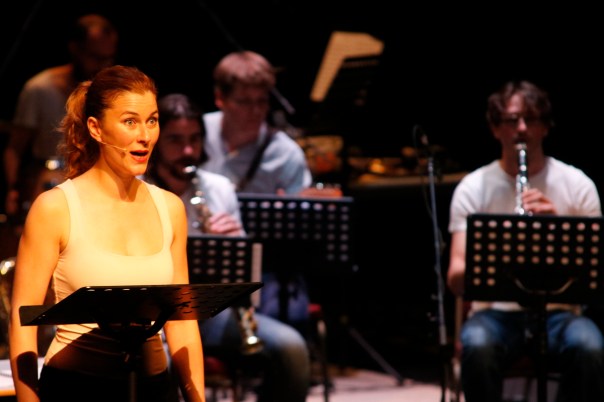
Review by Simon Eales
When, in Samuel Beckett’s Endgame, the character Hamm says “Use your head, can’t you, use your head. You’re on earth, there’s no cure for that,” we edge a little closer to understanding what futility in the Irish playwright means. The sense of it is ‘there’s no getting out of the situation we’re in, so just use what you happen to have.’ This call to stark rationality gets renewed with each utterance. As impossible as it seems, there’s always a way to surpass the impasse.
This preoccupation—with exploring possibilities—forms the philosophical jumping off point for Austrian composer Berhard Lang’s new long-form, part concert, part music theatre piece, The Exhausted. Co-commissioned by BIFEM and Singapore’s Yon Siew Toh Conservatory of Music for young French ensemble, soundinitiative, it bears a compelling combination of traditional musical structure and experimental elements. Just as a line of coherence develops, we are jolted sideways into a new stratum.
In his 1992 essay L’épuisé, French philosopher Gilles Deleuze articulates Beckett’s exhaustion of possibilities within delimited sets of field. It’s from this essay that Lang takes this piece’s name, and its libretto. Deleuze explores the ways in which Beckett’s plays work and rework the iterations of physical and logical possibilities, providing some indication of why Beckett seems to require a unique style of viewing. His pieces are populated with characters and stories, but, as soon as they begin, their linearity discontinues. They become about what could have happened had what happened not happened.
Throughout soundinitiative’s performance, the twelve ensemble members break with conventional concert behaviour. They are physically gestural, cleaning their instruments for far longer, and more regularly, than could be practically useful, for example. Mezzo soprano, Fabienne Séveillac, carries most of the dramatic responsibility, stepping slowly at times, quickly at others, trance-like, across The Capital’s thrust. At one point she climbs aboard a table and, lying on it, sings. We are not necessarily watching musicians create a piece of music, but being drawn into a demonstration of the creation of musico-theatrical options.
This notion is concise in Beckett. His sparse settings, few characters, and severe repetition of words, allow him to strip individual phenomena of the power they draw as individual elements. His seemingly sovereign objects could easily not have existed. There seem to be many more possibilities presented here. They bifurcate licentiously, like when Séveillac repeats, “It is night, it is not night. It is night, it is not night,” as a funk bassline and jazzrock groove on the kit links a phase of arresting, strung sustain to an intriguing section of plucks, chimes, and short strums. The words of this latter section huddle around difficulty: “scruples,” “remorseful,” “not guilty.”
As Deleuze might find in Beckett, we come across many half-lines of monologue (delivered predominantly by Séveillac, but also by the ensemble as chorus), constantly stunted melodic progressions, various genres, and a vivid flirtation between cacophony and synthesis. Ensemble members flirt, too. Upon the concert beginning, the whole ensemble arrives, enigmatically engaging the audience with eye contact from their individual positions, before most leave the stage, only a few stragglers remaining. The stragglers then leave. Some players return, make to begin playing, then leave again. These syncopated entrances and exits continue for minutes.
As the piece develops, its collection of generic, modal, tonal, rhythmic, attitudinal, instrumental, physical, and psychological possibilities burgeons, pushing the modest limits of this festival goer’s receptivity. Pique moments, such as Joshua Hyde’s saxophone solo, satisfy what thirst there is for brilliant individualism. But there is genuine pleasure in the play of departures, the decomposition of structure, the humour, the joyful combination of disparate elements, and the phases of rhythmic repetition. We can also always plug into the piece’s verbal impasses to rejuvenate our interest in the instrumental ones: “I gave up before I was born”; “I am my father, I am my son.”
It’s worth noting that Lang’s composition is exceptionally well drilled by its players. In our post-performance correspondence, Séveillac emphasised the complexity of the rhythmic and tonal micro-variations within Lang’s structural looping. Such complexity is reminiscent of Beckett, and the ensemble’s execution of the loops is exceptional. Frequent glimmers of spirited expression in the playing, however, seem to signal a point of departure (in both Lang’s text and its performance) from how Beckett required his work to be performed. He would stringently determine things like stage direction, physical form, and attitude for those selected to realise them. Soundinitiative absorb the strokes of their conductor, who is lodged above and behind the audience, and, at the same time, manage to transform the movements of this intricately mechanised system into opportunities for joy. In doing so, they allow the influence of Deleuze’s generative philosophical style to attain a compelling resonance.
The Exhausted
By Bernhard Lang
soundinitiative
The Capital Theatre
Bendigo International Festival of Exploratory Music
4 September 2015
Simon Eales

